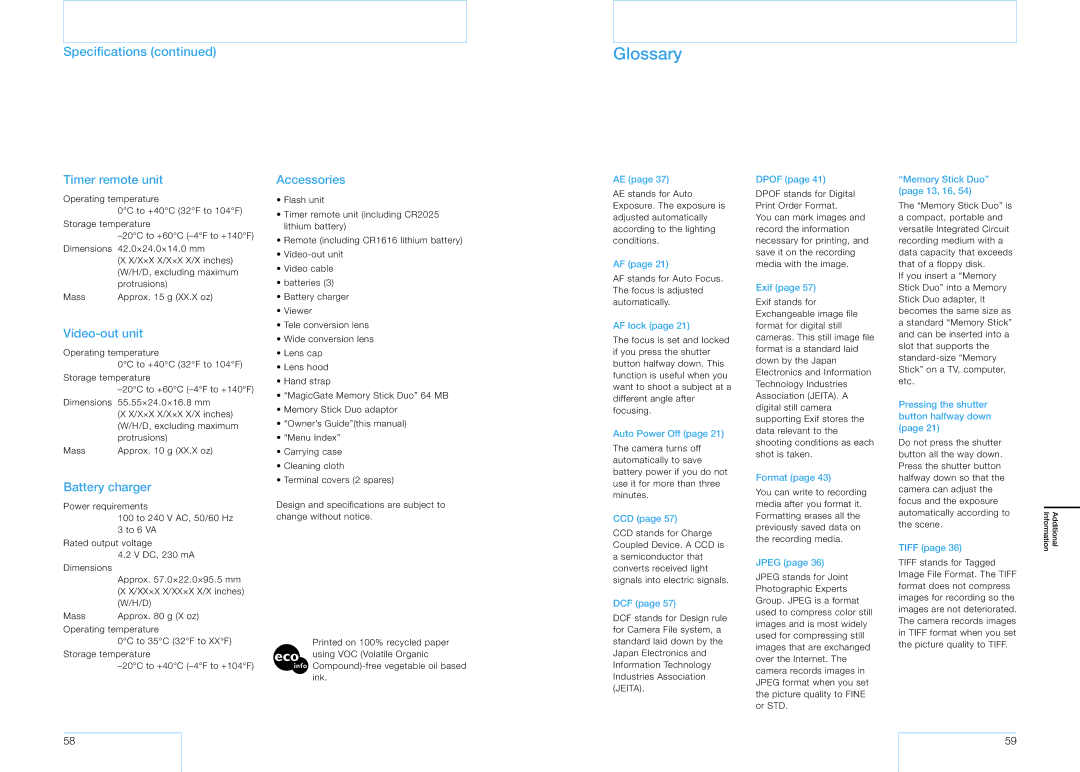
Specifications (continued)
Glossary
Timer remote unit
Operating temperature
0°C to +40°C (32°F to 104°F) Storage temperature
Dimensions | 42.0×24.0×14.0 mm |
| (X X/X×X X/X×X X/X inches) |
| (W/H/D, excluding maximum |
| protrusions) |
Mass | Approx. 15 g (XX.X oz) |
Video-out unit
Operating temperature
0°C to +40°C (32°F to 104°F) Storage temperature
Dimensions | 55.55×24.0×16.8 mm |
| (X X/X×X X/X×X X/X inches) |
| (W/H/D, excluding maximum |
| protrusions) |
Mass | Approx. 10 g (XX.X oz) |
Battery charger
Power requirements
100 to 240 V AC, 50/60 Hz
3 to 6 VA Rated output voltage
4.2 V DC, 230 mA
Dimensions
Approx. 57.0×22.0×95.5 mm (X X/XX×X X/XX×X X/X inches) (W/H/D)
Mass | Approx. 80 g (X oz) |
Operating temperature
0°C to 35°C (32°F to XX°F) Storage temperature
Accessories
•Flash unit
•Timer remote unit (including CR2025 lithium battery)
•Remote (including CR1616 lithium battery)
•
•Video cable
•batteries (3)
•Battery charger
•Viewer
•Tele conversion lens
•Wide conversion lens
•Lens cap
•Lens hood
•Hand strap
•“MagicGate Memory Stick Duo” 64 MB
•Memory Stick Duo adaptor
•“Owner’s Guide”(this manual)
•“Menu Index”
•Carrying case
•Cleaning cloth
•Terminal covers (2 spares)
Design and specifications are subject to change without notice.
Printed on 100% recycled paper using VOC (Volatile Organic
AE (page 37)
AE stands for Auto Exposure. The exposure is adjusted automatically according to the lighting conditions.
AF (page 21)
AF stands for Auto Focus. The focus is adjusted automatically.
AF lock (page 21)
The focus is set and locked if you press the shutter button halfway down. This function is useful when you want to shoot a subject at a different angle after focusing.
Auto Power Off (page 21)
The camera turns off automatically to save battery power if you do not use it for more than three minutes.
CCD (page 57)
CCD stands for Charge Coupled Device. A CCD is a semiconductor that converts received light signals into electric signals.
DCF (page 57)
DCF stands for Design rule for Camera File system, a standard laid down by the Japan Electronics and Information Technology Industries Association (JEITA).
DPOF (page 41)
DPOF stands for Digital Print Order Format.
You can mark images and record the information necessary for printing, and save it on the recording media with the image.
Exif (page 57)
Exif stands for Exchangeable image file format for digital still cameras. This still image file format is a standard laid down by the Japan Electronics and Information Technology Industries Association (JEITA). A digital still camera supporting Exif stores the data relevant to the shooting conditions as each shot is taken.
Format (page 43)
You can write to recording media after you format it. Formatting erases all the previously saved data on the recording media.
JPEG (page 36)
JPEG stands for Joint Photographic Experts Group. JPEG is a format used to compress color still images and is most widely used for compressing still images that are exchanged over the Internet. The camera records images in JPEG format when you set the picture quality to FINE or STD.
“Memory Stick Duo” (page 13, 16, 54)
The “Memory Stick Duo” is a compact, portable and versatile Integrated Circuit recording medium with a data capacity that exceeds that of a floppy disk.
If you insert a “Memory Stick Duo” into a Memory Stick Duo adapter, it becomes the same size as a standard “Memory Stick” and can be inserted into a slot that supports the
Pressing the shutter button halfway down (page 21)
Do not press the shutter button all the way down. Press the shutter button halfway down so that the camera can adjust the focus and the exposure automatically according to the scene.
TIFF (page 36)
TIFF stands for Tagged Image File Format. The TIFF format does not compress images for recording so the images are not deteriorated. The camera records images in TIFF format when you set the picture quality to TIFF.
Additional Information
58
59
